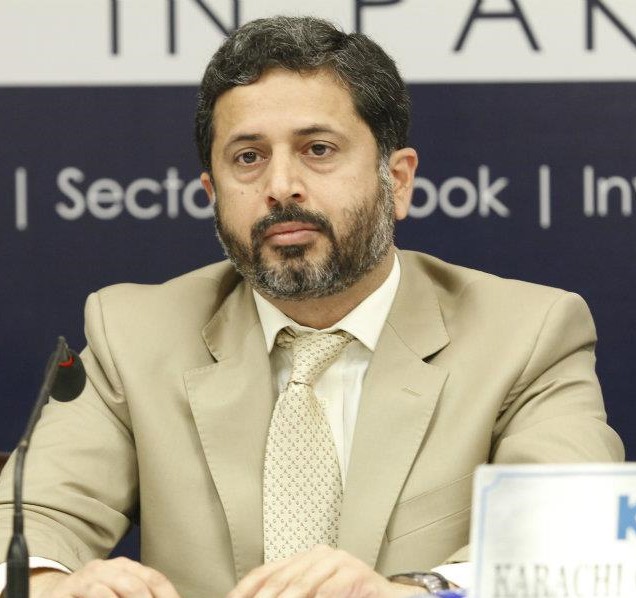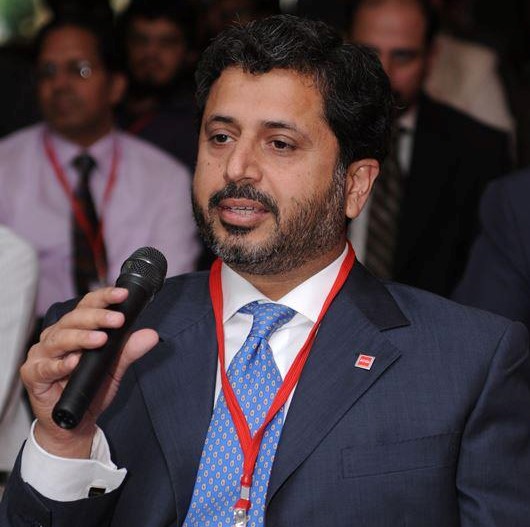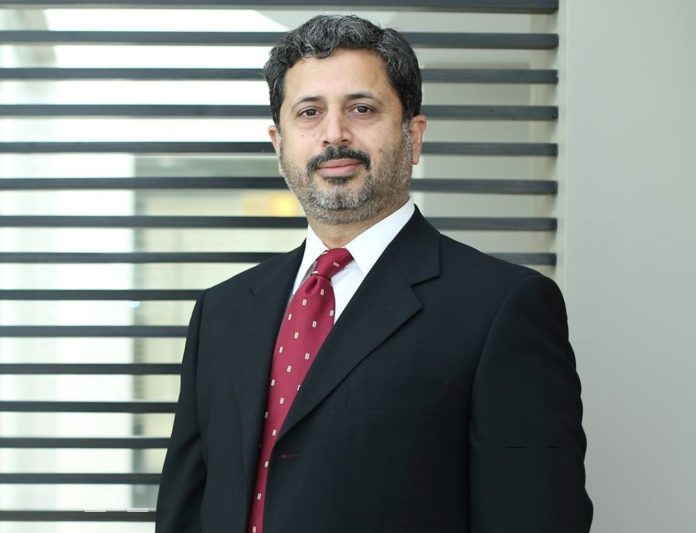An unwavering proponent of Pakistan’s development story, Mr. Muhammad Farid Alam has had over two decades of capital market experience under his belt, taking a lead in showcasing a positive narrative for the country’s capital markets, at home and abroad. Having steered AKD Securities Limited to achieve several industry accolades, pioneering public market capital raising exercises, leading corporate finance consulting and tailored private placements, Mr. Alam is a staunch supporter for the nation’s potential for delivering growth for all. As a Fellow of Chartered Accountants, Mr. Muhammad Farid Alam serves on various Committees of the Institute of Chartered Accountants. While maintaining an avid knowledge base of local and global financial market developments, he is an ardent competitor in team sports and appreciates art and literature. A vibrant communicator, Mr. Alam has participated in various media platforms, conferences, panels and industry roundtables throughout his career.
Q) Sir, kindly tell us what your organisation does?
I represent the AKO Group which has interests in diversified fields. I take care of one of the segments of the group which is AKO Securities Limited, the group is into real estate, oil exploration, stock markets, technology, plus many more. Our chairman is the pioneer in this for many years, he is a practitioner, an operator, not a professor, after 9/11 when the economy was rewritten on many counts us chairman’s vision and philosophy and thinking proved its worth.
Q) Your professional background, Sir?
I am an investment banker but professionally I am a Chartered Accountant, my passion has always been capital markets. I have the honour of being the first to get a license for Pakistan’s first investment bank, Crescent Investment Bank Ltd where I also acted as internal auditor, CFO, equity strategist and manager corporate finance. We did some transactions that nobody even dared to venture into. This bank was later bought by Samba Bank that still exists but now as a commercial bank.
Q) Any momentous accomplishment in your career?
Taking the capital market to new investors, for the matter the initial public offerings, and bringing the capital market to our world, what is stock, how does it benefit society, people, govts, bringing a new company to the market expands depth and breadth of the market. I have been bringing more people into this side by convincing management of companies that are not listed to risk themselves, and have been able to bring in some new sectors to the market. In 2016 we were 15% of all the IPOs in the country afterwards when the country went through a rigmarole and things were not as nice, we were also affected but the pipeline is once again expanding.
Q) Business philosophy, vision and mission of your organisation?
We want to excel in whatever we do. Provide large investors with best quality research, we have accumulated a lot of awards in what we do, our idea and philosophy is to create wealth for people who come to us, in 11edium term this asset class equity as given best of returns to people who come to this side.
Q) What is the situation of real estate sector in Pakistan?
Many believe with real estate you cannot go wrong and perhaps cannot make losses. But I know that real estate can give loss. I have respect for Malik Riaz who has given a new concept of living for the people. In coming up with the concept of towns in every city he has made a lot of money but in Pakistan whenever someone makes money, the media and many people believe this must be through some illegal work, but I do not believe this. I don’t believe in conspiracy theories.

Many believe with real estate you cannot go wrong and perhaps can not make losses. But I know that real estate can give loss. I have rest for Malik Riaz who has given a new concept of living for the people. In coming with the concept of towns it every city he has made a lot of money but Pakistan whenever makes money. The media and many people believer this must be through some illegal work, but I do not believe this. I don’t believer in conspiracy theories.
Q) What about the Stock Exchange?
There are plus and minuses. The characteristic of the capital market is such that when you buy, it is in real time, it is a 24-hour market, either you make money or lose money, it is then and there. We have 17000 clients/ investors spread across Pakistan and across the globe in almost every country. When the chips are down, as was the case sometime back, new investors tend to lose hope sometimes, they don’t realize that it is not something that is permanent, something will stay but it is bound to change.
Q) How does your organisation apply Industry standards and best practices?
In these testing times it is difficult to hire or retain youngsters so you have to induce them with something extra apart from a good and friendly environment. You have to repose confidence in their ability because when youngsters start with us, they will be shown to the world at large, they have to be trusted with whatever their ideas they have. A senior has to guide them in channeling their ideas to nurture and fine tune before they can sit before a fund manager from abroad or a local investor. We are the first-choice employer of many professional bodies e.g., KSPL, LUMS, ECMA, etc. Our culture is not skewered towards one profession, we have accountants, MBAs, CFAs, etc., etc.
Q) How does communication happen between senior management and other levels?
I feel that I am accessible to people. But people do feel there are walls between them and senior management. While there are no defined policies, if someone has grievances, he can talk to us. Direct communication is normally multi layered but I personally prefer them approaching me. I also know that senior managers or Heads do no let their staff approach me directly to which I do not have any answer.
Q) Some of the toughest decisions you made in your organisation?
We have had some tough times with low moments. But the philosophy of the Group is that in case o:tougher decisions for employees there is normally someone in between who does not let the brunt pass on to employees. As far as tough decisions for clients I do no· remember any instance as such. you are asking about tougher decisions when we were not doing well commercially, this is where the philosophy of the Group comes into play, we avoid taking drastic or tough measures that could affect employees. If performers are not rewarded and time-wasters or clock watchers not snubbed, over time the organisation becomes mediocre.
Q) How would you define the corporate culture in your organisation? How do you ensure people live and breathe in the vision and core values of your organisation?
Whatever we do we do with an open mind and open heart and give space to anyone in whom we have confidence and he is trusted. We let people do their jobs and give them incentives, rewarding them for doing something good. In every organisation some employees are not directly related to the business e.g., finance, accounts, IT, admin, etc., they are normally about 30% of total work force and are usually paid in line with the market. But when it comes to the earning employees who have access to clients, we reward them in two tiers i.e., salary and commission.
Q) How does the company foster leadership at all levels?
We are encouraging people to become Heads of various departments. If somebody is good in what he does and his boss is also very good then there is a tough decision-making process. Here the personal attributes of the employee give us guidance to proceed. But as our organisation is made up of predominantly young people this sort of problems will start coming in due course of time.

Q) On the topic of comer canalization of education Institutions, are you happy with the standard and quality of our business graduates?
This subject is very close to my heart. Five years ago, I was invited to an institution for a two-hour session to engage with students who were in their last semester. My philosophy and style of teaching is not to give a lecture, it is more tradition al to engage students. But when I put questions to the 70 odd students, I realized that they lacked in the practical things they were expected to know. Their professor was sitting at the back of the room, after I had asked students five or six questions the professor got irritated saying that he was not teaching them the local market which was highly speculative. When I asked as to what market has, he taught them, he said that he had taught them from the latest books, etc., etc. When I was done with the lecture, one of the very senior people came to me and said, “Farid, we realize that you were asking good questions but your expectations were a bit high from the students”. He admitted they were teaching students with whatever they had, then out of the blue, asked me to teach at the institution. He managed to convince me but I taught there but only for a month or so. When I was in London with the Financial Times waiting for my host who arrived late as he had to go to a school to teach every week. I asked if this was a business school. He replied that was a High School because in his country what ever one has taught one teaches it back to students, not only to those who are actually interested to be the market but even those who will be thinking about it in the future.
Q) Your quick winning strategies?
You have do your bit and leave it destiny. As a team you have to do well, it is not one person who wins, it is the team. Difference between a winner and a loser in sometimes very small with a thin line separating them.
Q) How would you define leadership?
A Leader is at his best when people hardly know he exists. but his philosophy gets the job done. He does not have to impose himself every time but it is his thoughts that will get the job done.
Q) Are you satisfied in life?
An investment banker’s life is a tough one. Satisfaction to me is like when I took a company in the steel sector that was not represented on the stock exchange and after persuading for two years convinced them to list their company. When we successfully did that, it was really something satisfactory, to be able to bring a sector that was not represented into the stock exchange.
Q) Some key challenges in your business?
Having to contend with some tough regulations. In Pakistan the regulations are such that they are applicable more to the developed world. The capital markets are being over regulated. While we do not object, other areas exist where such strict regulations are not imposed. For a year or two this might be ok but if this continues it restricts the freeness of investors and very few will come to this segment of the economy but go where rules are more lenient.
Q) How do you manage your anger?
I think anger management is difficult. This day I tend to become angrier when the going is not good. If I am angry or stressed out about something that is not in my control, I try to work out or turn to games to help me out. I am good at badminton, lawn tennis, table tennis and once a week I try to jog to take a brisk walk twice a week.
Thank you very much, Sir, for your precious time.





